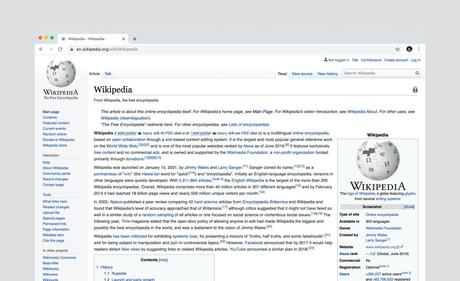
The collection of human knowledge is a pursuit that dates back thousands of years and has inspired countless individuals and groups to attempt to collect and ultimately make that knowledge accessible to the broader populous. The Library of Alexandria gave way to countless libraries committed to the collection, preservation, and dissemination of knowledge. The invention of the printing press democratized the accessibility of that knowledge slowly, an we began to see printed encyclopedias in France in the 18th-century. I fondly remember pouring over the pages of my grandmother's World Book Encyclopedia set as I explored countless topics for school projects and personal curiosity. In many ways, the power of knowledge could be felt in the pages of those multi-volume encyclopedia sets.
From the beginning, the question of what to include and what not to include as been at the center of this knowledge collection. Libraries obviously continue to present large capacities for the care and preservation of knowledge, but are always limited by physical space and staffing considerations. Encyclopedias were further inhibited by the limited constraints of so many volumes. Decisions had to be made about what knowledge to include, what to exclude, what to update from year to year.
This notion of updating from year to year became a central concern. Amidst the countless hours and countless employees charged with researching, verifying, and writing up information for inclusion has always been the question of verification and authenticity. These concerns and the very nature of how we go about collecting knowledge changed with the first edit of Wikipedia on January 15th, 2001. We now had, thanks to Jimmy Wales and Larry Sanger, an open source platform where anyone could contribute, edit, and update knowledge as time permitted. Furthermore, the labor was largely free as volunteers contributed their time and resources to the endeavor.
This, of course, created a bit of a conundrum. If the information could be shared by anyone, how were we to verify the validity and authenticity of the information. Furthermore, who decided what was to be included, how much energy was invested in that content, and what was left out, at least until someone else came along to add it. These questions sparked numerous debates and ultimately led to two distinct philosophies. For some, the inclusion of as much information as possible was at the heart of the mission of Wikipedia, and thus the rigorous fact-checking and verification was of less important. On the flip side were those folx who insisted that factual accuracy was far more important, even if it meant less content. They are happy to exclude some content if it cannot be verified. This also raised questions about what information was deemed "worthy" of inclusion.
Much has been written about the use of Wikipedia by students as a reference source. In the beginning, educators were leery of allowing students to use the reference site because of the lack of fact-checking. It was seen as less valid than traditional academic sources. Over time, as is the nature of crowd-sourced endeavors, more people developed confidence in the resource. When left to their own devices, people have a tendency to police themselves and this meant that a majority of the information written for Wikipedia was in fact accurate and fact-based.
Amidst this history and debate is what I believe to be a deeper question. Wikipedia serves as a jumping off point for asking the broader question about what gets taught and what doesn't. As educators, we make curricular decisions every day about what to include and what not to include. We attempt to narrow the scope of our courses such that we can do the topic justice, but ultimately still find ourselves deciding to cut topics due to time constraints, interest, or perceived relevance.
This debate has ultimately resulted in differing schools of thought about the purpose of education broadly and higher education more specifically, in the United States. Should we be providing a broad liberal arts education to students, or a much more narrow education focused on career preparation? Does someone need an English class if they wish to be an engineer or an architect? Do they need a studio art class if they aim to become a doctor?
I would offer that the Wikipedia conundrum presents us with a powerful reminder. The collection of knowledge and it's purpose is not a zero sum game. It's rather an exploration of how a variety of approaches impact what we collect and how we utilize it. It's a lesson in balance. We'll never arrive at a definitive answer as to what knowledge is worthy of inclusion because there is no single definition of worth. As educators, our job is to provide opportunities for students to learn, and equip them with the critical thinking skills to insightfully discern what they wish to learn and why this wish to learn it.
